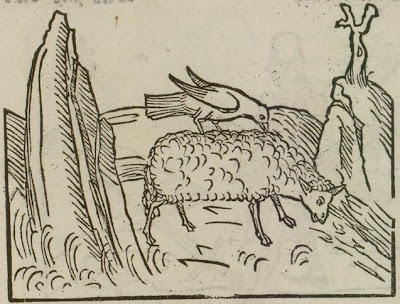SOURCE: For a complete edition of the fables of Desbillons, the 18th-century Jesuit scholar and poet, see GoogleBooks. This is fable 2.17. For parallel versions, see Perry 553.
READ OUT LOUD. Choose which marked text you prefer to practice with - macrons in verse form, or macrons in prose order, or accent marks in prose order, or focusing on the iambic meter. You will find materials for all of these options below. :-)
VERSE MACRONS. Here is the verse text with macrons:
Cornīcula sedēns in Ove dum tergum fodit:
Iniūriam ex tē quam patior, inquit Bidēns,
Canī sī facerēs, ferrēs infortūnium.
Rēspondet illa: Quibus egō illūdam, sciō,
Molesta placidīs, mōrigera ferōcibus.
Malitia saepe comitem habet prūdentiam.
PROSE MACRONS. Here is the same text with macrons written out in prose word order:
Dum Cornīcula, in Ove sedēns, tergum eius fodit: Bidēns inquit: Sī Canī iniūriam facerēs quam ex tē patior, infortūnium ferrēs. Illa rēspondet: Egō sciō quibus illūdam: molesta sum placidīs, mōrigera ferōcibus. Malitia saepe prūdentiam comitem habet.
STRESS (ACCENT) MARKS. Here is the prose text with accents, plus some color-coding for the words of three or more syllables (blue: penultimate stress; red: antepenultimate stress):
Dum Cornícula, in Ove sedens, tergum eius fodit: Bidens inquit: Si Cani iniúriam fáceres quam ex te pátior, infortúnium ferres. Illa respóndet: Ego scio quibus illúdam: molésta sum plácidis, morígera ferócibus. Malítia saepe prudéntiam cómitem habet.
IAMBIC METER. Here is the verse text with some color coding to assist in the iambic meter. The disyllabic elements (iambs/spondees) are not marked, but the trisyllabic elements are color-coded: dactyls are red, anapests are purple, and tribrachs are green (as is any proceleusmaticus, although that is a rare creature); for more information, here are some Notes on Iambic Meter.
Cornī·cula se·dēns in· Ove dum· tergum· fodit:
Iniū·ri~ ex· tē quam· patior,· inquit· Bidēns,
Canī· sī face·rēs, fer·rēs in·fortū·nium.
Rēspon·det il·la: Quibus· eg~ il·lūdam,· sciō,
Moles·ta placi·dīs, mō·rigera· ferō·cibus.
Maliti·a sae·pe comi·t~ habet· prūden·tiam.
IMAGE. Here is an illustration for the story (image source):
What follows is an unmarked version of the prose rendering to faciliate word searches:
Dum Cornicula, in Ove sedens, tergum eius fodit: Bidens inquit: Si Cani iniuriam faceres quam ex te patior, infortunium ferres. Illa respondet: Ego scio quibus illudam: molesta sum placidis, morigera ferocibus. Malitia saepe prudentiam comitem habet.
skip to main |
skip to sidebar
Stress-free Stress. Latin fables for reading out loud.
Subscribe
Blog Archive
-
▼
2010
(797)
-
▼
April
(170)
- Philosophus Atheniensis (Odo)
- Pica et Cuculus, quasi Accipiter (Abstemius)
- Milvus et Agricola (Desbillons)
- Asinus, Canis et Dominus (Odo)
- Vulpes et Gallina Incubans (Abstemius)
- Corvus et Lupi (Osius)
- Canis et Filius Domini Occisus (Abstemius)
- Hydrus et Rana (Abstemius)
- Cerva, Venator et Leo (Desbillons)
- Accipiter et Columba (Osius)
- Musca et Formica (Odo)
- Galli Inter Se Pugnantes (Abstemius)
- Asinus, Simia et Talpa (Desbillons)
- Abbas, Monachus et Ossa (Odo)
- Leo, Asinus, et Lepus (Osius)
- Aquila et Corvus Physicus (Odo)
- Eruditus et Troffulus (Desbillons)
- Cervus et Hinnulus (Barlow)
- Lupus et Hircus (Barlow)
- Vir Decrepitus et Arbores (Abstemius)
- Corvus et Vulpes (Barlow)
- Iupiter et Camelus (Barlow)
- Asinus et Vinum (Abstemius)
- Asinus in Pelle Leonis (Odo)
- Ursus et Uxor Eius (Abstemius)
- Pater Senex et Filius Eius (Odo)
- Ciconia et Cattus (Odo)
- Rosa et Amarantus (Desbillons)
- Capi (Osius)
- Pueri et Ranae (Desbillons)
- Cervus, Leo et Leaena Mortua (Abstemius)
- Gallus Vulpinam Pellem Fugiens (Abstemius)
- Leo et Rana (Desbillons)
- Simia et Vulpes (Barlow)
- Aquila et Corvus (Barlow)
- Asinus Cantans in Curia Leonis (Odo)
- Abbas et Pulex (Odo)
- Cera (Osius)
- Puer et Coluber (Desbillons)
- Lupus et Canes Duo (Abstemius)
- Equus Aegrotans et Canis (Desbillons)
- Asinus et Hircus Equitans (Odo)
- Mulier et Gallina (Osius)
- Canis et Ovis (Barlow)
- Ranae Duae (Desbillons)
- Thunnus et Delphinus (Osius)
- Serpens, Vir et Simius Iudex (Abstemius)
- Pavo Deplumatus (Odo)
- Membra et Venter (Barlow)
- Vulpes et Lupus in Fossa (Abstemius)
- Leo, Asinus et Vulpes (Barlow)
- Leo Aegrotans et Vulpes (Barlow)
- Graculus et Pavones (Barlow)
- Grues et Anseres (Barlow)
- Pavo et Luscinia (Barlow)
- Aper Excors (Osius)
- Cornix (Osius)
- Boves et Leo (Osius)
- Harundo et Quercus (Osius)
- Grus et Pavo (Osius)
- Mus et Milvus (Osius)
- Aquila et Cucula (Odo)
- Pauper et Thesaurus (Abstemius)
- Cupido et Mors (Barlow)
- Pastor et Mare (Camerarius)
- Asellus et Equus (Desbillons)
- Vulpes et Foramen (Abstemius)
- Vipera et Lima (Barlow)
- Lupus, Vulpes et Asinus Confitentes (Odo)
- Cochlea Domigera (Osius)
- Gallina Auripara (Osius)
- Testudo et Aquila (Abstemius)
- Femina, Maritus et Mors (Desbillons)
- Vespa et Aranea (Odo)
- Lepores et Ranae (Barlow)
- Leo Epulum Animalibus Facit (Abstemius)
- Canis et Asinus (Barlow)
- Scarabaeus et Stercus (Odo)
- Olea et Cucurbita (Abstemius)
- Ovis et Cornicula (Desbillons)
- Avarus et Invidus (Barlow)
- Castor (Barlow)
- Upupa et Luscinia (Odo)
- Ollae Duae (Barlow)
- Bubo et Aquila (Abstemius)
- Camelus et Iupiter (Desbillons)
- Fringilla (Desbillons)
- Asinus Rubos Comedens (Barlow)
- Vulpes et Sentes (Osius)
- Hirundo et Cornix (Camerarius)
- Aethiops (Camerarius)
- Simia (Osius)
- Agricola (Osius)
- Anguis et Cancer (Camerarius)
- Musca et Formica (Barlow)
- Auceps et Cassita (Osius)
- Lupus et Haedus (Desbillons)
- Agna, Haedi et Lupus (Osius)
- Puer et Fortuna (Desbillons)
- Vespae et Perdices (Camerarius)
-
▼
April
(170)
Bestiaria Latina Blog
Animalia
Bestiaria Proverbs
Random Aesop Widget
NoDictionaries.com
Need help reading Latin? Try Lee Butterman's NoDictionaries.com website. Cut and paste your Latin text into the box provided, and it will generate a word list. Find out more.
About Me
Here are the books I have written: Aesop's Fables, Aesop's Fables in Latin, Mille Fabulae et Una, Latin Via Proverbs, Vulgate Verses, and Roman Sudoku.






